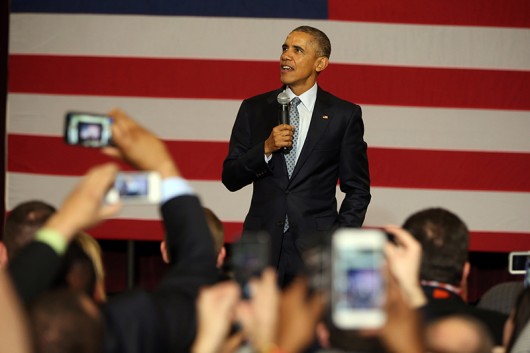
President Barack Obama stops at the Hoogland Center for the Arts in Springfield, Ill., following his speech at the Illinois State Capitol on Feb. 10. Credit: Courtesy of TNS
President Barack Obama’s critics accuse him of being weak — of not leading. When they do give him credit for leading, which is not often, they say he is “leading from behind.” Across both sides of the political aisle, people want this president to display strong leadership. But what does that even mean? What does “strong leadership” look like? “Strong leadership” is as metaphorical, abstract and vague as “hope and change,” the president’s 2008 campaign slogan.
I think “strong leadership” is code for being more aggressive — being more hawkish in political speak. Specifically as it relates to foreign policy, it means being more brash, more interventionist and more cocksure. Unfortunately, it also means lashing out before considering the full and long-term ramifications of certain actions. The president’s critics will not use the terms “dovish” and “hawkish” — defining the president as the former — because that sort of imagery conjures up comparisons with former President George W. Bush, whose hawkish foreign-policy endeavors still entangle the United States. Even so many years later, these endeavors are not popular with the American people, Democrats and Republicans alike. Rather than directly calling the president a dove, with intent to avoid the aforementioned comparison with Bush’s foreign policy — which is a losing argument for them — they simply accuse the president of being a weak leader.
Make no mistake, the same people who accuse the president of not being a strong leader want more U.S. intervention abroad, and the majority of that type of intervention looks rather similar to the Bush administration. Many congratulations go out to these critics, as they have simultaneously and successfully done two things. First, they have managed to discredit the president’s character and resolve, rather convincingly. Second, and more cleverly, they have managed to call the president a weak leader for not being as interventionist as Bush without invoking the Bush foreign-policy legacy.
Perhaps the foreign policy of Democratic presidential candidate and former Secretary of State Hillary Clinton will be more in tune with the desires of Obama’s critics. Clinton recognizes the role the United States must play in the world, and how a lack of American leadership abroad leaves open a vacuum for Putin’s Russia, the ayatollah’s Iran and communist China to fill, which means no “leading from behind” is allowed. But on the flip side of the coin, Clinton is no neoconservative — she won’t be appointing Donald Rumsfeld or Dick Cheney to her cabinet. People like John McCain or Lindsey Graham should find her foreign policy more palatable, even though she will be more calculated, and her foreign policy will be more reserved than Bush’s. The sad part is that Obama’s critics are likely to criticize Clinton’s foreign policy, regardless of what it actually is. This is a byproduct of our intense partisanship in this country, which leads to divisiveness, and that is unfortunate. When our foreign policy is not delivered through one voice, it weakens America.
I am not proselytizing for Clinton’s candidacy, but I am fairly convinced that her foreign policy will stake out a middle ground between the over-intervention of the Bush years and the under-intervention of the Obama years. This should please a lot more people, yet I have a funny feeling it will please very few.
Andrew Podob
First-year doctorate student studying American politics


